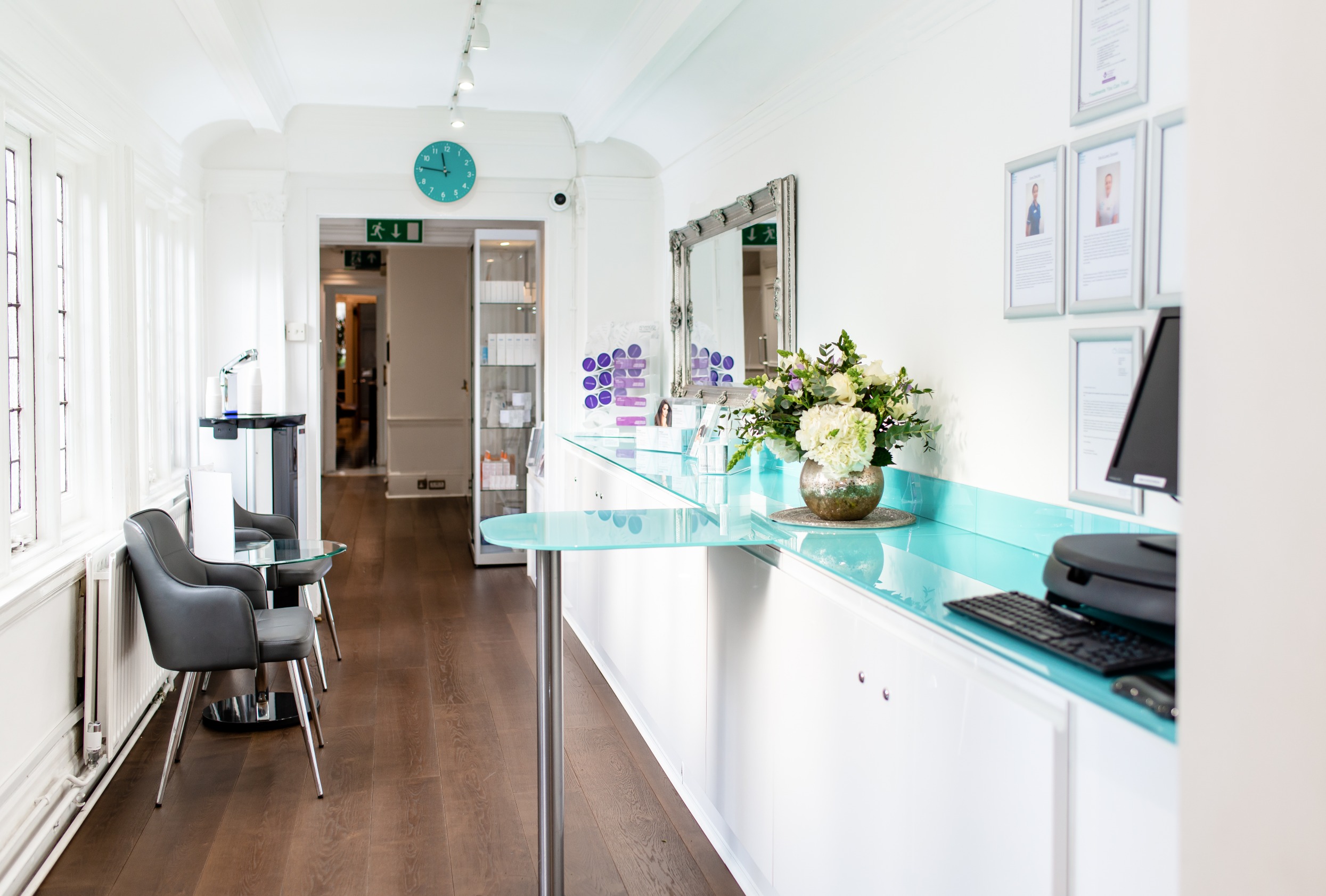
- Personalised Melasma treatment plans
- Visible results over time
- Expert medical practitioners with years of experience
What’s on this page
- About this Treatment
- What to Expect
- FAQs
- Our Clinics
- Why the Private Clinic
- Meet the Experts
- Related Blogs & News
Medically reviewed by Lorcan Sheppard BSc MBBS FRCA, Chief Medical Officer for The Private Clinic.
Last Reviewed July 16th 2023
Related Treatments
Melasma
Melasma is most common in women between the ages of 20 and 40 and usually affects the cheeks, bridge of the nose, forehead and upper lip.
What causes Melasma?
It is most often caused by the hormonal changes or fluctuations that occur during pregnancy, though it can happen at any time. These hormones mean that dark patches are more likely to develop when your skin is exposed to sunlight. Ultraviolet light and even strong light from light bulbs can also stimulate this dark pigmentation, and it is more prevalent in dark-skinned races, particularly Hispanic, Asian, Indian and people from the Middle East and Northern Africa. Only 10% of Melasma sufferers are men.
Melasma Treatments
At all of our clinics across the UK, we are privileged to see the life-changing effects and results of our Melasma Treatments, both aesthetically and emotionally.
We provide a range of treatments to suit all individuals including Obagi Skin Care and Skin Peels.
Our therapists are renowned for their expertise and experience in treating skin conditions.
We are the UK’s leading non-invasive and minimally invasive cosmetic group of clinics and have some of the most experienced melasma specialists in the industry who can advise on the best treatment for your condition.
The next step is to book a consultation to discuss your area of concern. We treat thousands of patients every year and pride ourselves on our knowledge and expertise. All of our Clinics are registered with the Care Quality Commission.
What to Expect
The Private Clinic has been treating patients for over 40 years with thousands of people placing their trust in us each year. We pride ourselves on being able to offer a personalised service. We have a team of friendly nurses and expert surgeons who understand the importance of this decision and will support you throughout your journey with us.
Melasma Treatment
We offer a range of effective treatments for Melasma depending on your severity and skin condition.
Obagi
One of the most effective treatments we offer for Melasma is the Obagi Nu-Derm System, which is a complete skin care system specifically formulated to transform troubled and ageing skin.
Chemical Peels
Chemical Peels can also be an effective treatment for Melasma and our medical team have lots of qualifications and experience in delivering safe and effective peels for patients.
Dermatologist
Should you wish to see a Dermatologist, you can arrange an appointment with our Consultant Dermatologist for advice and treatment plans.

After Your Melasma Treatment
The majority of patients are able to get back to normal activities straight away following a chemical peel treatment. Depending on the strength of the peel, some mild peeling should be expected in the days following treatment but this will be fully explained to you by your skin practitioner ahead of treatment. The Obagi Nu Derm system can also cause skin peeling or flaking initiall whilst your skin begins to build tolerance to this.

FAQs
Frequently Asked Questions
The average cost for Melasma treatments start from £200, but this will depend on the type of treatment required.
You can arrange a consultation with one of our qualified therapists to discuss the best laser or peel treatment for you. Consultations with our expert skin practitioners costs £25 which is refundable against your chosen skin treatment.
Alternatively, you can arrange to see our Consultant Dermatologist for an evaluation of your skin and a bespoke treatment plan. The cost of the consultation is £200. Dermatologist consultations are available at our London Harley Street clinic.
At The Private Clinic we have a range of treatments to suit all skin types to help reduce the appearance of melasma on the skin.
Chemical Peel
Chemical peels can help to improve melasma by removing the outer cells of the skin that contain the pigmentation.
Microneedling
Dermaroller or Dermapen treatment works to create controlled damage to the skin which promotes new collagen and healthy cells to form which helps to improve your skin’s texture reduce the appearance of melasma and other types of hyperpigmentation.
Obagi Nu-Derm System
Melasma can be treated with prescription topical agents such as our Obagi Nu-Derm system. This is a series of skin care products which contain prescription 4% hydroquinoine to help reduce the visible signs of hyperpigmentation.
Microdermabrasion
Microdermabrasion is a method by which very fine crystals are vacuumed across the skin under pressure. The treatment works to increas the cell turnover rate, which speeds the transit any unwanted pigment out of your skin. Microdermabrasion is usually combined with a chemical peel but can be performed as a stand-alone treatment for very mild forms of Melasma.
Laser Skin Resurfacing
Some forms of Melasma can be effectively treated using our Laser Skin Resurfacing treatment. We offer Pearl Laser Skin Resurfacing, Pearl Fractitional Laser Resurfacing or Pearl Fusion Laser Skin Resurfacing. The three different treatments allow practitioners to create the most tailored experience for your skin’s needs and achieve the best possible outcome.
To find out more about which melasma treatment is going to be best for you. Book a free consultation with one of our skin experts.
Melasma treatment is difficult. At The Private Clinic we have a variety of treatments to help reduce the apperance of Melasma but these should not be seen as a cure.
If melasma occurs during pregnancy, in most cases it will dissapear again a few months after delivery of the baby but it may return should you become pregnant again.
At The Private Clinic we do not treat any paitents who are pregnant and recommend that any type of Hydroquinone and retinoid creams are avoided in pregnancy as they could cause harm to the baby.
Our range of treatments can help to reduce the appearance but it is important to remember that, melasma will most often return after stopping the treatments so patients should expect to continue with regular treatment to achieve the best results.
The specific cause of Melasma is still unknown, but it is reported to be because of the pigment-producing cells in the skin (melanocytes) producing too much pigment (melanin).
Factors that can contribute to developing melasma, include;
- Pregnancy
- Birth Control Pills
- Hormone
- Replacement
- Medical problems that affect hormones
- Certain medications medications such as anti-epileptics.
- Exposure to ultraviolet (UV) light
- Use of sun-beds
- Phototherapy
Melasma is more commonly developed by women, particularly during pregnancy where up to 50% of women can be affected. It is also more common in people of colour and those who tan very quickly. Melasma is not hereditary but it is more common in people with a family history of the condition.
Melasma; also known as ‘chloasma’ or ‘pregnancy mask’ is a common skin condition that develops in adults where brown or grey coloured patches of pigmentation develop on the skin, usually on the face.
Melasma is more noticeable in the summer as your skin is exposed to more sunlight and seems to improve during the winter months.
Melasma is not an infection of the skin and is not contagious. It is also not cancerous and will not develop into skin cancer.
melasma treatment is Available in these Clinics
Why Choose The Private Clinic
- Expert medical practitioners with years of experience.
- State of the art medical facilities, all registered by the CQC (Care Quality Commission).
- Our innovative treatment choice means you will be offered the most advanced minimally invasive treatment options.
- When it comes to non-surgical treatments we always strive to give you little to no downtime, so you can get back to enjoying life.

Meet our Medical Experts
We are the UK’s leading non-invasive cosmetic group and have some of the most experienced dermatologists, as well as leading therapists across the country.






